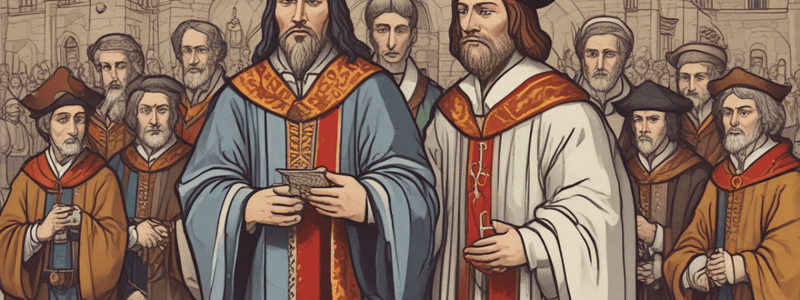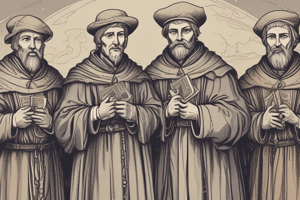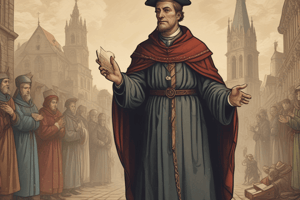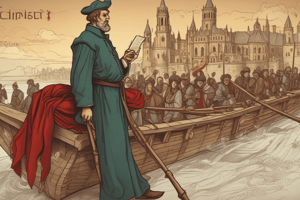Podcast
Questions and Answers
What were the two main principles of the Protestant Reformation?
What were the two main principles of the Protestant Reformation?
- Tradition alone and Scripture alone
- Reason alone and Experience alone
- Faith alone and Scripture alone (correct)
- Church alone and Scripture alone
What was a major consequence of the Protestant Reformation?
What was a major consequence of the Protestant Reformation?
- The Pope was overthrown
- The Bible was banned
- Wars broke out between Catholics and Protestants (correct)
- The Catholic Church became more powerful
What was the name of the monastic order founded by Ignatius of Loyola?
What was the name of the monastic order founded by Ignatius of Loyola?
- The Benedictines
- The Franciscans
- The Dominicans
- The Jesuits (correct)
Who is credited with rediscovering the Americas in 1492?
Who is credited with rediscovering the Americas in 1492?
What is the term for the exchange of plants, fruits, vegetables, diseases, and other items between the Old and New Worlds?
What is the term for the exchange of plants, fruits, vegetables, diseases, and other items between the Old and New Worlds?
What was one of the positive consequences of the Age of Exploration?
What was one of the positive consequences of the Age of Exploration?
What was the main objective of Prince Henry the Navigator?
What was the main objective of Prince Henry the Navigator?
What was the term for Europe, Africa, and Asia?
What was the term for Europe, Africa, and Asia?
What was the outcome of the Protestant Reformation in terms of social order?
What was the outcome of the Protestant Reformation in terms of social order?
What was the main consequence of the Counter-Reformation?
What was the main consequence of the Counter-Reformation?
What was the catalyst for the Protestant Revolution in 1517?
What was the catalyst for the Protestant Revolution in 1517?
What was a positive outcome of the Protestant Reformation?
What was a positive outcome of the Protestant Reformation?
What did women gain as a result of the Protestant Reformation?
What did women gain as a result of the Protestant Reformation?
What was the focus of the Protestant Reformation?
What was the focus of the Protestant Reformation?
What was the Catholic Reformation a response to?
What was the Catholic Reformation a response to?
What was the result of the Protestant Reformation for the Catholic Church?
What was the result of the Protestant Reformation for the Catholic Church?
Who was a prominent reformer during the Protestant Reformation?
Who was a prominent reformer during the Protestant Reformation?
What was the Ana-baptist movement focused on?
What was the Ana-baptist movement focused on?
What was the Council of Trent convened to respond to?
What was the Council of Trent convened to respond to?
What was the Protestant Reformation an attempt to do?
What was the Protestant Reformation an attempt to do?
What was one of the items that the explorers took back to the Old World from the New World?
What was one of the items that the explorers took back to the Old World from the New World?
What was the primary goal of mercantilism?
What was the primary goal of mercantilism?
What was the significance of the transatlantic slave trade?
What was the significance of the transatlantic slave trade?
Which of the following was NOT a consequence of the Scientific Revolution?
Which of the following was NOT a consequence of the Scientific Revolution?
Who developed the scientific method?
Who developed the scientific method?
What was the main idea of Copernicus' heliocentric model?
What was the main idea of Copernicus' heliocentric model?
What was the period known as the Enlightenment?
What was the period known as the Enlightenment?
What was the significance of the Silk Road?
What was the significance of the Silk Road?
What was the outcome of the Columbian Exchange?
What was the outcome of the Columbian Exchange?
During the Scientific Revolution, which of the following sciences made significant progress?
During the Scientific Revolution, which of the following sciences made significant progress?
Who is credited with formulating the heliocentric model?
Who is credited with formulating the heliocentric model?
What did Galileo Galilei contribute to the development of?
What did Galileo Galilei contribute to the development of?
What is the name of the law formulated by Isaac Newton that describes the force of attraction between objects?
What is the name of the law formulated by Isaac Newton that describes the force of attraction between objects?
What area of mathematics was developed during the 16th and 17th centuries?
What area of mathematics was developed during the 16th and 17th centuries?
Who is credited with developing human anatomy as a science?
Who is credited with developing human anatomy as a science?
What period saw the rise of medicine and chemistry as disciplines?
What period saw the rise of medicine and chemistry as disciplines?
What was the key factor that led to the development of medicine and chemistry during the 16th and 17th centuries?
What was the key factor that led to the development of medicine and chemistry during the 16th and 17th centuries?
What would not have been possible without the period's dissections, experimentation, and dedication to notation and observation?
What would not have been possible without the period's dissections, experimentation, and dedication to notation and observation?
What was the consequence of Galileo Galilei's support for the heliocentric model?
What was the consequence of Galileo Galilei's support for the heliocentric model?
What was the focus of the scientists of the 16th and 17th centuries in their study of the natural world and the human body?
What was the focus of the scientists of the 16th and 17th centuries in their study of the natural world and the human body?
Flashcards are hidden until you start studying
Study Notes
The Protestant Reformation
- Began in 1517 when Martin Luther published his Ninety-Five Theses
- Resulted in large portions of the European population leaving the Catholic Church
- Led to a loss of power for the Pope and Catholic clergy
- Positive consequences included:
- Increased emphasis on education for boys and girls
- Focus on independent thought
- Women gained new rights, such as the right to divorce and marry
- Increased role of the family as the center of life
- Despite the changes, most peasants found it impossible to change their everyday lives, even after leading significant revolts
- Other reformers, such as John Calvin, carried on the causes of the Protestant Reformation
- Calvin believed in predestination
The Catholic Reformation
- Was the Roman Catholic church's counter-movement to address the concerns of Martin Luther and other religious reformers
- The Council of Trent was convened to respond to the Protestant Reformation
- The Jesuits were a religious group created during the Catholic Reformation
- They engaged in extensive missionary activity for Catholicism
The Age of Exploration
- Was a time when European explorers began traveling en masse to other continents, especially the Americas
- Also known as the Age of Discovery
- Lasted from the 15th to the 18th century
- Explorers such as Christopher Columbus, John Cabot, Vasco Nunez de Balboa, and Ponce de Leon claimed new lands for their respective crowns
- The Columbian Exchange was the exchange of plants, fruits, vegetables, disease, and other items between the Old and New Worlds
- Positive consequences included the discovery of new foods from the Americas
- Negative consequences included the destruction of most Native American societies
The Columbian Exchange
- Was the exchange of plants, fruits, vegetables, disease, and other items between the Old and New Worlds after the explorations of Christopher Columbus
- Items taken back to the Old World included turkeys, tomatoes, and habanero peppers
- Items received by the New World included sugarcane, coffee, and horses
- Negative consequences included slavery and disease
Science and the Scientific Revolution
- Was a wave of scholars proposing a new way of thinking that transformed society through the elevation of science as the source of truth
- Key to this was the scientific method, developed by Francis Bacon
- The Scientific Revolution began when Copernicus published a book that challenged the view of the Earth as the center of the universe
- The climax of the Scientific Revolution was when Isaac Newton published his series of books, which used the scientific method to challenge many of the oldest traditional assumptions about the universe
- The Scientific Revolution established science, supported through experiments, as the source of truth, completely changing how society looked at and understood the universe
Medicine and Chemistry in the 16th and 17th Centuries
- Saw medicine and chemistry come into their own as disciplines
- Occurred largely due to the increased emphasis on empiricism by the scientists of the period
- Pioneering dissections, endless experimentation, and dedication to notation and observation led to the development of medicine and chemistry as highly specialized disciplines
Studying That Suits You
Use AI to generate personalized quizzes and flashcards to suit your learning preferences.




